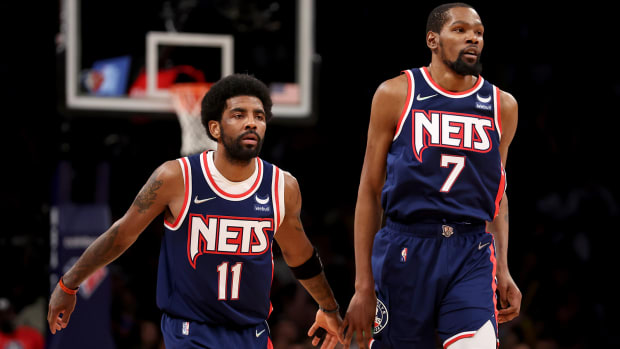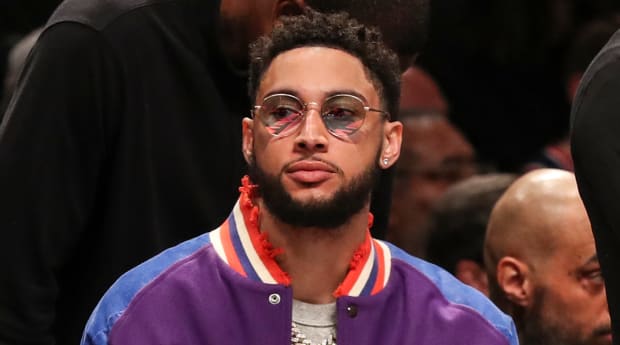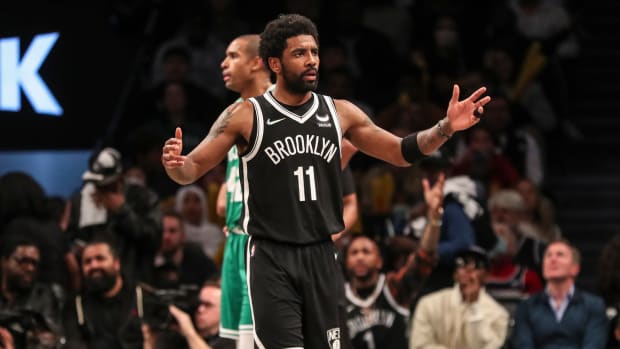NEW YORK — In his last meaningful moment of a quickly fading season, Kyrie Irving shimmied and shifted, unleashed a series of nifty dribbles, burst into the lane, and … tossed up an errant, well-contested floater against a much taller defender.
And there was the Nets’ season in one sobering snapshot: all razzle-dazzle and bravado, with absolutely nothing to show for it—just confusion and humiliation and a vague sense of regret.
It all mercifully ended Monday night in Brooklyn, with a 116-112 loss to the Celtics, the final blow in a stunning first-round series sweep—and the coda to a uniquely strange, disjointed and joyless season.
The Nets opened as a superteam with supreme aspirations, and finished as one of the greatest disappointments in NBA history. In the aftermath, they cited all the obvious factors: Kevin Durant’s midseason knee injury, the trade of James Harden for Ben Simmons, the inability to ever get Simmons on the court, the lack of continuity or cohesion, all of it fair and factual.

Brad Penner/USA TODAY Sports
Yet the greater truth of this Nets season is that it was doomed from the start, from the moment Irving refused the COVID-19 vaccine and made himself ineligible for every home game, robbing the Nets of their most creative scorer, forcing Durant to shoulder a heavier load, alienating Harden, ultimately leading to a reluctant trade for Simmons, who never played a game because of both physical and mental health concerns.
The Nets of 2021-22 are not the first superteam to stumble or implode; they’re not even the most spectacular imploder this season. That distinction belongs to the Lakers of LeBron James and Anthony Davis and Russell Westbrook, who couldn’t even make the play-in tournament.
But the Nets are the first superteam to be sabotaged from within, by a star who shunned his team obligations in favor of his own quixotic political crusade. Irving missed the first 35 games of the season because of his stance, played only in road games for three months and ultimately appeared in just 29 of 82 games, effectively by choice.
Along the way, the Nets had to weather Durant’s knee injury (and six-week absence), Harden’s indifference and a dozen other setbacks. But Irving destabilized them from Day One. The Nets never should have been a 7th seed, and never should have faced an opponent this stout in the first round.
“It was just really heavy emotionally this season,” Irving said Monday night, before acknowledging for the first time that he bore some responsibility, saying: “I felt like I was letting the team down at a point, where I wasn’t able to play.” It was the most self-awareness Irving has allowed since this saga began.
The Nets will comfort themselves with the obvious: They’ll return next fall with the greatest scorer in the game and two other All-NBA talents, all of them presumably healthy and unencumbered by COVID regulations. They could be title favorites once more.
Except for this: Those other two All-NBA talents happen to be the two most mercurial and unreliable stars in the league.

Wendell Cruz/USA TODAY Sports
In the last year alone, Simmons has staged a virtual shooting strike in a playoff series (with Philadelphia), sulked over the backlash, issued a trade demand and refused to play or practice with his team. Since getting his desired trade, Simmons still hasn’t played, either because of a back injury or mental health concerns, or both. He was reportedly ready to make his Nets debut on Monday, until suddenly he wasn’t. He was not on the bench, or even in the arena, for the Nets’ final game—officially, because his back was bothering him, according to the team.
As for Irving? In his three-year Nets tenure, he has played in just 103 of a possible 226 games, missing the other 123 to a combination of injuries, vaccine refusal and, last season, a mysterious two-week break. Over the last five years, Irving has missed 41 percent of his teams’ games.
Even without COVID restrictions, can the Nets count on Irving to play a full season? And what if COVID surges again, and the vaccine mandates return? And what of Simmons? Even if his back is healed by next season, what of his “mental readiness” issues? Were those specific to Philadelphia and irrelevant now in Brooklyn? Could they resurface?
And what happens when Simmons finally takes the court with Durant and Irving and has to accept—for the first time in his career—not being his team’s primary ballhandler and playmaker?
How comfortable can a team be when two of its three pillars are dotted with asterisks?
“Extremely uncomfortable,” said a rival team executive. “It’s hard to win it all. To win 16 playoff games, you have to believe this is the only thing that matters.”
Which begs the question: When was the last time Irving or Simmons gave the impression that a championship is their top priority?

Wendell Cruz/USA Today Sports
Irving did win a title alongside LeBron James back in 2016. But just a year later, he was forcing the Cavaliers to trade him. He landed in Boston, where he spent two years grating on coaches and teammates, missed one postseason and drifted aimlessly through another before leaving to sign with Brooklyn.
It’s fair to wonder: Do either of these guys care about their teammates? About winning? About winning it all?
Watch NBA games online all season long with fuboTV: Start with a 7-day free trial!
Irving holds a $36.5 million option for next season. He could decline it and seek a new contract worth $245 million over five years. Does any of that sound palatable, given his history? And yet the Nets have little choice but to re-sign him, given his close bond with Durant and their salary-cap limitations. If Irving leaves in free agency, they won’t be able to replace him with commensurate talent.
“He’s Kyrie—you don’t know what’s going to happen,” said another rival executive. “And you don’t want him holding you hostage for the next four years.”
And if Irving is signed to a long-term max deal, he becomes nearly untradeable—a high-priced, high-risk commodity.
“Everybody knows what he’s about at this point in his career,” the executive said. “We’ve all heard the stories, we’ve all talked to the teams that he’s been with.”
And yet, the same person noted, “I can’t say they’re better off without his talent. He’s so damn good.”
So this is who the Nets will likely be for the foreseeable future—a top-heavy team with one aging superstar, his eccentric best buddy and a 6’11” mystery box with a bad back and aversion to shooting.
On talent alone, the Nets could plausibly carve a path to the Finals next season. But as the Nets themselves just demonstrated, talent without coherence or commitment is a road to nowhere.
- Celtics Fans Can Start Dreaming of a Championship
- Steve Nash Is Being Exposed Against Boston
- NBA Mock Draft: Biggest Risers and Fallers
- Next NBA Teams to Take a Major Leap
Sports Illustrated may receive compensation for some links to products and services on this website.







